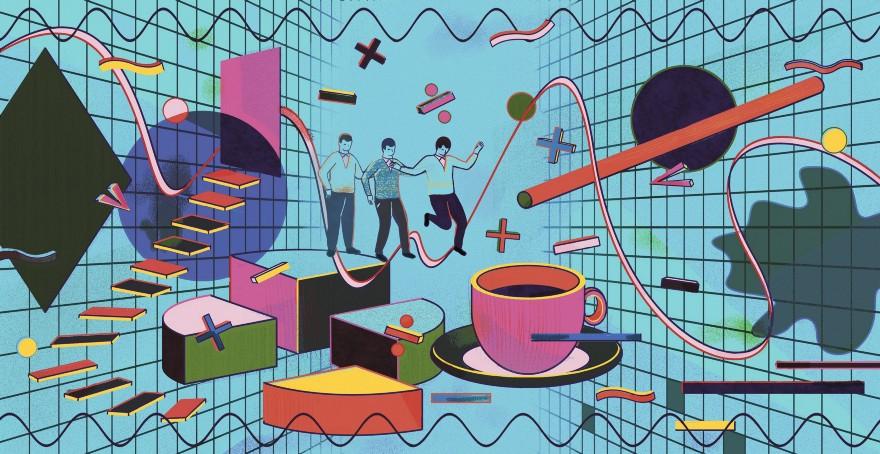Learn more about problemsolving with this collection
Improving sleep through mindful breathing exercises
Practicing stress reduction and relaxation techniques
Establishing a relaxing bedtime routine
A Big Question
Where do ideas come from? That’s a big question. Here’s a smaller one: Where do mathematical ideas come from? I’ve wondered about this from the time I first contemplated being a mathematician until long after I officially became one.
14
175 reads
My earliest memory of anything like a mathematical idea comes from a childhood walk with my dad. We left the house and made our way toward downtown Metuchen, the tiny town in central Jersey where I grew up, to a little luncheonette called the Corner Confectionery. I can still picture it: the rack of newspapers, magazines, and comic books; the ice-cream treats in the back corner; the long counter with stools, where I used to sit and spin until I was told to stop. It was about a mile-long walk, reserved for special occasions.
12
70 reads
On that bright fall morning, we strolled up Spring Street—a beautiful street lined with huge oak trees—and talked about fractions, though I wouldn’t have known to call them that. We were puzzling over—or, rather, I was puzzling over—how to fairly divide a pie (probably one of the Corner Confectionery’s apple pies). My dad, a mathematical physicist, a man with an active mind, but one of few words, was a gentle guide, letting me think through things on my own.
12
46 reads
We took our time walking, and we also took our time thinking and talking about the basic properties of numbers. In my head, it was easy to cut the pie in half, and then in half again, and again: two, four, or eight pieces. But, somewhere near Main Street, I got stuck on how to reliably create three, five, or six pieces. I started thinking about making bigger numbers out of smaller numbers. This leisurely walk through the neighborhood soon led me to the exciting idea that twelve was a great number. Twelve could be divided by one, two, three, four, and six. That’s a lot of numbers! ...
12
41 reads
This leisurely walk through the neighborhood soon led me to the exciting idea that twelve was a great number. Twelve could be divided by one, two, three, four, and six. That's a lot of numbers! If I had a pie cut into twelve pieces, it would be easy to divvy up dessert for many different-sized groups of friends. By the time we crossed the railroad tracks and arrived at the door of the Confectionery, I thought that I had made a remarkable discovery: Everyone! Stop! We need to think about the world in terms of twelves!
12
37 reads
Ten or so years later, when I was a college freshman, I would learn that I had stumbled upon an instance of what is called an abundant number, a phenomenon first studied by the ancient Greeks. An abundant number is smaller than the sum of its divisors: in my case, the sum of one, two, three, four, and six (twelve's divisors) is sixteen. That morning with my dad, I didn't have a name for this phenomenon, but I was happy nonetheless, and maybe even happier because I was ignorant of the larger picture. It was my own surprising little discovery, born of walking and puzzling. Magic all around ...
12
36 reads
As odd as it might sound, I've never been particularly confident of my mathematical abilities. I don't mean the arithmetic part, the part that people usually associate with being a mathematician. ("Hey, let Dan calculate the tip! Ha ha!") It's true that I'm probably better than average at mental math, but that's not really what makes a mathematician a mathematician. My job is to come up with ideas. Sometimes we mathematicians call the things we think about and work with "objects," which doesn't mean triangles, spheres, or other shapes.
12
35 reads
Mathematical objects are big ideas about algebra, geometry, and logic, about the properties and definitions of numbers. It's not at all obvious how to go about thinking up some new twist on these things-the transformation from test-taker to theorem poser and then theorem prover is difficult to articulate. My ideas have always felt contingent and magical to me. I don't think I'm alone, at least as far as the magic goes ...
12
31 reads
Where do ideas come from? That’s a big question. Here’s a smaller one: Where do mathematical ideas come from? I’ve wondered about this from the time I first contemplated being a mathematician until long after I officially became one. My earliest memory of anything like a mathematical idea comes from a childhood walk with my dad. We left the house and made our way toward downtown Metuchen, the tiny town in central Jersey where I grew up, to a little luncheonette called the Corner Confectionery.
8
14 reads
I can still picture it: the rack of newspapers, magazines, and comic books; the ice-cream treats in the back corner; the long counter with stools, where I used to sit and spin until I was told to stop. It was about a mile-long walk, reserved for special occasions. On that bright fall morning, we strolled up Spring Street—a beautiful street lined with huge oak trees—and talked about fractions, though I wouldn’t have known to call them that. We were puzzling over—or, rather, I was puzzling over—how to fairly divide a pie (probably one of the Corner Confectionery’s apple pies).
8
5 reads
My dad, a mathematical physicist, a man with an active mind, but one of few words, was a gentle guide, letting me think through things on my own. We took our time walking, and we also took our time thinking and talking about the basic properties of numbers. In my head, it was easy to cut the pie in half, and then in half again, and again: two, four, or eight pieces. But, somewhere near Main Street, I got stuck on how to reliably create three, five, or six pieces. I started thinking about making bigger numbers out of smaller numbers.
8
4 reads
This leisurely walk through the neighborhood soon led me to the exciting idea that twelve was a great number. Twelve could be divided by one, two, three, four, and six. That’s a lot of numbers! If I had a pie cut into twelve pieces, it would be easy to divvy up dessert for many different-sized groups of friends. By the time we crossed the railroad tracks and arrived at the door of the Confectionery, I thought that I had made a remarkable discovery: Everyone! Stop! We need to think about the world in terms of twelves!...
8
4 reads
CURATED BY
More like this
1 idea
The Myth and Magic of Generating New Ideas
newyorker.com
4 ideas
The Myth and Magic of Generating New Ideas
newyorker.com
1 idea
Does one have to be a genius to do maths?
terrytao.wordpress.com
Read & Learn
20x Faster
without
deepstash
with
deepstash
with
deepstash
Access to 200,000+ ideas
—
Access to the mobile app
—
Unlimited idea saving & library
—
—
Unlimited history
—
—
Unlimited listening to ideas
—
—
Downloading & offline access
—
—
Personalized recommendations
—
—
Supercharge your mind with one idea per day
Enter your email and spend 1 minute every day to learn something new.
I agree to receive email updates


